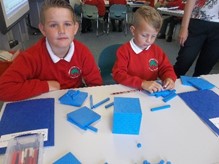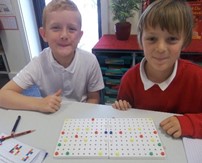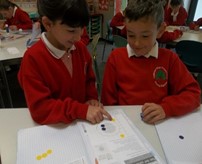Welcome to Maths at Lightmoor
Intent
At Lightmoor, we want pupils to understand mathematics as having relevance in their own lives and in the world in general, recognising that mathematics will be used constantly to help them to solve problems they meet in everyday life. Our aim is to equip all pupils with the skills and confidence to solve a wide range of mathematical problems which are built upon during a child’s time at Lightmoor. We intend to create a vocabulary rich environment where children are confident in explaining their answers, orally and written, using the correct mathematical vocabulary. We aim to create a platform whereby children can reason mathematically while understanding the interconnected ideas and patterns that encapsulate being a mathematician. It is our drive here at Lightmoor to ensure that our learning in mathematics is real and meaningful for our pupils and that it is as creative and practical as possible. We aim to bring learning to life as a strategy for helping our children embed their learning and to help them to ‘know more and to remember more!’
Implementation
Our Maths curriculum provides breadth and balance, is relevant and engaging and is adapted to match the needs and abilities of all our children to ensure that all pupils are able to excel.
Every class from EYFS to Y6 follows the White Rose scheme of learning which ensures coverage of the national curriculum objectives in a logical sequence. Lessons may be personalised to address the individual needs and requirements for a class but coverage is maintained. Additionally, we use I see, Collins and NRich resources to further develop the children’s reasoning and problem-solving skills and enrich our children’s maths diet. As a school, we recognise the key to unlocking the potential in our children is through the development of basic mathematical skills and the understanding of mathematical concepts. We therefore place great emphasis on the use of concrete resources and pictorial representations at all ages, to enable children to fully understand the concepts and principals, when presented with abstract calculations and questions. Where children require additional support, ‘scaffolds’ are used to support children further to ensure that they have secured the small step before moving on. These ‘scaffolds’ may be in the form of returning to concrete resources or pictorial representations. Progression documents such as our calculation policy are carefully used to ensure that children are not being stretched outside their year group but rather deepened within it.
Mastering Number is used in Reception as their whole curriculum and ensures secure, firm foundations in the development of good number sense; White Rose is used to ensure coverage of shape objectives in reception. Mastering Number is an additional 10-minute session for Years 1 to 5 which supports the children learning key declarative knowledge to automaticity. In years 1 and Mastering Number aims to give children fluency in calculation and flexibility in number to ensure success in their transition to KS2 mathematics. In year 3, Mastering Number may be repeated at the discretion of the teacher depending on the class’s confidence with number. Knowledge of multiplication and division and its applications are integral to success in KS2 and KS3; therefore, Mastering Number is used in Years 4 and 5 to ensure fluency in multiplicative facts. To support this, Times Table Rockstars is an app which allows children to develop their fluency in rapid recall of tables up to 12 x 12 by playing games. Children from Y2 – Y6 can consolidate and apply their times tables knowledge four times a week in school through completing times table rockstars worksheets: a daily 3-minute assessment. Furthermore, the children practise their times table knowledge at home by accessing their Times Table Rockstars account and through competing in internal and external school competitions.
Daily assessment is incorporated throughout the lesson through live and verbal feedback. End of topic and end of term summative assessments are used as a diagnostic tool to ensure that teachers are adapting learning to meet the needs of all children and ensure that any necessary interventions are targeted specifically to meet the needs of children. Moreover, our intervention, ‘Number Stacks’, specifically targets the gaps in the individual children’s knowledge through a concrete, pictorial and abstract approach consistent with our mathematics curriculum.
Impact
The impact of our mathematics curriculum is that children understand the relevance and importance of what they are learning in relation to real world concepts. Children know that maths is a vital life skill that they will rely on in many areas of their daily life. Children have a positive view of maths due to learning in an environment where maths is promoted as being an exciting and enjoyable subject in which they can investigate and ask questions; they know that it is OK to be ‘wrong’ and that this can strengthen their learning because the journey to finding an answer is most important. Children are confident to ‘have a go’ and choose the equipment they need to help them to learn along with the strategies they think are best suited to each problem. Our children have a good understanding of their strengths and targets for development in maths and what they need to do to improve. Our math’s books evidence work of a high standard of which children clearly take pride; the range of activities demonstrate good coverage of fluency, reasoning and problem solving. Our feedback and interventions support children to strive to be the best mathematicians they can be. There are clear end points for pupils in all year groups to achieve age related expectations and an expectation that children will reach national expectations or above at the end of KS2.



‘Mathematics is, in its own way, the poetry of logical ideas.’ - Albert Einstein
Mathematics Lead: Mr Payne
Maths Progression Grids (Reception to Year 6)
